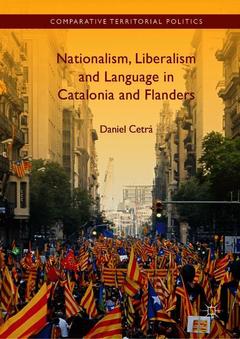Description
Nationalism, Liberalism and Language in Catalonia and Flanders, 1st ed. 2019
Comparative Territorial Politics Series
Author: Cetrà Daniel
Language: English
Subject for Nationalism, Liberalism and Language in Catalonia and...:
Keywords
political theory; nationalism; liberalism; communitarianism; Will Kymlicka; Charles Taylor; Brian Barry; linguistic justice; language rights; ethnolinguistic mobilization; Catalan nationalism; Flemish nationalism; Nation-building; immersion system; territoriality; Flemish Periphery; liberal nationalism; language debates; Contextual Analysis; facility communes
210 p. · 14.8x21 cm · Hardback
Description
/li>Contents
/li>Biography
/li>Comment
/li>




